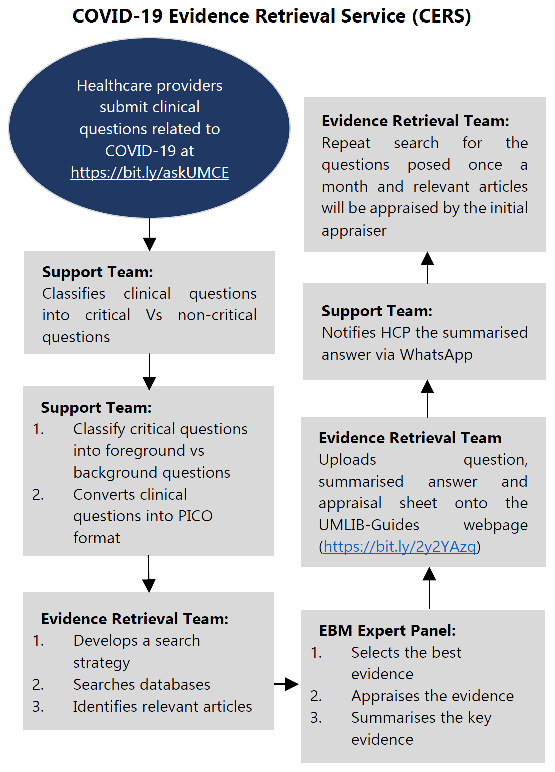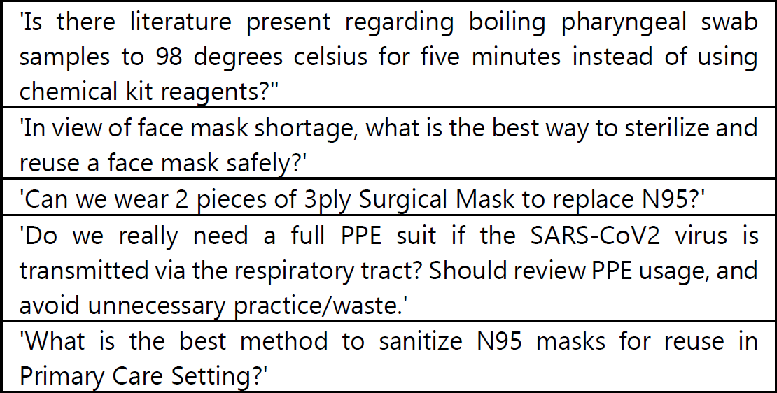Flowchart of CERS Operational Structure

Wei Z. Chew1, Su M. Liew2, Julia P. Engkasan3, Noran N. Hairi4, Ka T. Ng5, Teng CL6, Ranita H. Shunmugam7, Choo W. Yuen8, Chirk J. Ng2
doi: http://dx.doi.org/10.5195/ijms.2023.1905
Volume 11, Number 2: 154-157
Received 24 11 2022; Rev-request 16 02 2023; Rev-recd 23 02 2023; Accepted 20 04 2023
During the initial stages of the COVID-19 pandemic, policies and treatment guidelines underwent rapid and frequent revisions based on varying levels of evidence. The COVID-19 Evidence Retrieval Service (CERS) was founded to uphold patient care with the conscientious use of EBM amidst the emergent nature of the pandemic to ensure that local clinicians were well-updated on the latest evidence on COVID-19 according to local needs.
As the first medical student and a coordinator in CERS, I was involved in designing, implementing, and running of CERS. My role as a coordinator often involved identifying and resolving issues ahead of time. This meant that my responsibilities ranged from managerial to administrative to service provision. This allowed me to always retain a macroscopic perspective of the service. This article further analyses my experience and further applications from setting up this service.
CERS was initiated and supported by a multidisciplinary team of qualified EBM practitioners (professors from various specialties like primary care, rehabilitation, and family medicine), medical officers, senior medical students, and academic librarians across different educational institutions. This service built upon the team member's initial study, 1 and incorporated the experience of Grandage et. Al, 2 who highlighted the efficacy of academic librarians and the American Gastroenterology Association, 3 who condensed their recommendations while keeping clinicians aware of the shortcomings of the guiding research.
Three main teams were involved in the service's process: the support, evidence retrieval, and expert panel. The support team oversaw retrieving and segmenting clinical queries into the Population, Intervention, Control, and Outcome (PICO) 4 format and sending pre-appraisal forms containing the relevant literature to the experts. They would then receive completed appraisals from the experts and send a summary via WhatsApp to the clinician asking the question. The evidence retrieval team would conduct a thorough search for literature and upload the completed appraisal forms to the website. The expert panel identified the best evidence provided by the evidence retrieval team, appraised it, and would conduct their search for relevant papers if they believed that the literature provided was unsuitable.
Working in a multidisciplinary team allowed me to hone my communication skills by presenting information concisely and appropriately to team members of various hierarchies. To ensure that morale was high, weekly virtual team meetings were organized to ensure that the team members were aware of the service's efficacy and could see their impact.
The service was piloted across public hospitals in Malaysia on the 21st of March 2020, with support provided by the Faculty of Medicine, University of Malaya. Weekly publication of the service occurred via the team members' communication networks to clinicians based in Malaysia to raise awareness of this service. Dissemination was carried out through existing WhatsApp group chats, research mailing lists, and posters being displayed physically around various hospitals. Clinicians interested in the service would contact the service and fill in their questions via Google Forms. These questions would then be categorized into critical or non-critical questions and background or foreground questions. The distinction between critical and non-critical questions was made because critical questions would alter the clinician's healthcare practice. Background questions were defined as questions with established answers, and foreground questions were defined as questions requiring an appraisal of the available evidence.
Figure 1 provides a visual representation of the service. The search strategy was conducted by identifying and searching for key concepts alongside the terms in Table 1. The databases searched are listed as follows: MEDLINE, Cochrane Library, COVID-19, TRIP Database, Wiley, UpToDate, WHO database, CINAHL, Ovid database-COVID-19 special collection, Clinical Trials (clinicaltrials.gov), Web of Science, Science Direct, Google Scholar, Google. CEBM ERS and the Ministry of Health, Singapore, also had their databases searched. These search strings would then be saved on the respective clinical search structure to allow the search to be rerun after 4-6 weeks. Given the nature of rapidly evolving evidence, this repeated search run was necessary to incorporate any new evidence into the appraisal. Any further evidence would undergo the same process of appraisal and dissemination.
Figure 1.Flowchart of CERS Operational Structure

Search Strings Used.
| (wuhan, OR buaian) | “coronavirus”[MeSH Terms] |
|---|---|
| 2019 novel cox | Coronavirus infection* |
| 2019nCoV | 2019 novel coronavirus* |
| 2019-nCoV | novel coronavirus |
| 2019-novel corona virus (2019-nCoV)" | novel coronavirus pneumonia (NCP) |
| soronavir* | betacoronavir* |
| coronavirus | DEOX |
| coronavirus infections"[McSH, Terms] | sarcov2 |
| COV2 | . COVID-19 |
| COVID 19 | Cav |
| COVID19 | COVID |
| NCP | SARS-CoV-2 |
| new coronavirus | sari |
| SARS | severe acute respiratory syndrome corona virus-2 |
| severe acute respiratory infection (sari) | (SARS-CoV-2) |
| Wuhan pneumonia | corona virus |
Our experience proved that many opportunities arise from a virtual work environment. The virtual environment contributed to CERS' sustainability as it allowed team members to work at their convenience and collaborate with members from different institutions and disciplines. The inclusionary nature of this service should have far-reaching effects in the future because of the expansion of local networks of researchers with a similar.
Table 2.Composition of Meeting Attendees.
| Date | Number of attendees at the meeting | Profile of attendees | Meeting duration (hours) |
|---|---|---|---|
| 26/03 | 4 | Professor Medical officer (X2) Medical student |
1 |
| 28/03 | 3 | Professor (X2) Medical student |
1.5 |
| 3/04 | 9 | Professor (X5) Medical officer (X2) Medical librarian Medical student |
1.5 |
| 10/04 | 10 | Professor (X6) Medical officer (X2) Medical librarian Medical student |
1.5 |
| 24/04 | 10 | Professor (X6) Medical officer (X2) Medical librarian Medical student |
1.5 |
| 07/05 | 9 | Professor (X6) Medical officer (X2) Medical librarian Medical student |
1 |
CERS fulfills a niche in catering to the needs of the local population in Malaysia. Having a local service reduces the barriers for a clinician to ask questions because the service members recognize cultural nuances while providing a platform for local medical student participation and education.
Figure 2.Unique Questions Received by CERS.

Formal feedback was sought from users who engaged with the service. 11 out of 12 users reported feeling satisfied or very satisfied with the service and rating the quality of answers as high or very high. A further 75% (8/12) of respondents reported that using this service significantly changed their clinical practice. The mean time it took for questions to be answered from the time it was received for our sample size was 10.5 days (range 1-19 days, median =10 days).
Our experience has reinforced that an integrated, evidence-based retrieval service is feasible and useful for two reasons. Firstly, it supports healthcare workers – both future and current - and policymakers in making informed decisions. Secondly, undertaking systematic appraisals efficiently trains the next generation of practitioners to prioritize an evidence-based approach.
The cohort of medical students, including myself, involved in CERS has used the skills learned – literature searching and critical appraisal skills - to complete and publish their research across various specialties in different peer-reviewed journals. The leadership skills developed through this evidence retrieval service have also enabled them to make substantial contributions during their clinical placements by presenting cases in multi-disciplinary team meetings.
Developing A Clinical Evidence Retrieval Service In Response To The COVID-19 Pandemic
Addressing a local population's health needs through equipping front line workers who needed to concentrate their efforts on addressing patient's acute needs. Further, identifying opportunities for medical students to further their development as medical education took a break during the pandemic.
Sharing lessons learnt and offering a consultancy service for aspiring medical students/clinicians wanting to start their own local evidence retrieval service.
Each population has unique circumstances. A local evidence retrieval service addresses these needs while training the next generation of doctors in evidence-based medicine. The lessons learnt from our experience can help to accelerate the composition and starting of similar services which have long lasting impacts for clinicians served and medical students educated.
CERS would like to thank the librarian team for their continual efforts in ensuring that the service is furnished with the appropriate literature. The role of the different clinicians in providing the necessary clinical questions to run the process is also much appreciated. Special thanks are due to Chrislyn Pereira for proofreading the manuscript.
The Authors have no funding, financial relationships or conflicts of interest to disclose.
Conceptualization: WZC, SML, JPE, NNH, KTN, TCL, RHS, CWY, CJN. Writing - Original Draft: WZC, SML, JPE, NNH, KTN, TCL, RHS, CWY, CJN. Writing - Review Editing: WZC, SML, JPE, NNH, KTN, TCL, RHS, CWY, CJN.
1. Ho GJ, Liew SM, Ng CJ, Hisham Shunmugam R, Glasziou P. Development of a Search Strategy for an Evidence Based Retrieval Service. PLoS One. 2016;11(12):e0167170.
2. Grandage KK, Slawson DC, Shaughnessy AF. When less is more: a practical approach to searching for evidence-based answers. J Med Libr Assoc. 2002 Jul; 90(3): 298–304.
3. Gewertz BL, Ottinger LW, Rogers AL. American Gastroenterological Association Medical Position Statement: guidelines on intestinal ischemia. Gastroenterology. 2000;118(5):951–3.
4. Aslam S, Emmanuel P. Formulating a researchable question: A critical step for facilitating good clinical research. Indian J Sex Transm Dis AIDS. 2010;31(1):47–50.
Wei Z. Chew, 1 MBChB. University of Glasgow, Glasgow, United Kingdom.
Su M. Liew, 2 MBBS, MMed (FamMed), PhD. Department of Primary Care Medicine, Faculty of Medicine, University of Malaya, Kuala Lumpur, Malaysia.
Julia P. Engkasan, 3 MBBS, MRehabMed, PhD, Department of Rehabilitation Medicine, Faculty of Medicine, University of Malaya, Kuala Lumpur, Malaysia.
Noran N. Hairi, 4 MBBS, MPH, MPH (Epidemiology), PhD Department of Social and Preventive Medicine, Faculty of Medicine, University of Malaya, Kuala Lumpur, Malaysia, Faculty of Public Health, Universitas Airlangga, Indonesia.
Ka T. Ng, 5 MBChB. Department of Anaesthesiology, Faculty of Medicine, University Malaya, Kuala Lumpur, Malaysia.
Teng CL, 6 MBBS, MFamMed, FRACGP. Department of Family Medicine, Seremban Campus, Kuala Lumpur, Malaysia.
Ranita H. Shunmugam, 7 PhD. University Malaya Library, Kuala Lumpur, Malaysia.
Choo W. Yuen, 8 BSc, MMedSc, PhD. Department of Social and Preventive Medicine, Faculty of Medicine, University of Malaya, Kuala Lumpur, Malaysia.
Chirk J. Ng, 2 MBBS, MMed (FamMed), PhD. Department of Primary Care Medicine, Faculty of Medicine, University of Malaya, Kuala Lumpur, Malaysia.
About the Author: Wei Zhuen Chew is a junior doctor with a strong interest in incorporating evidence-based medicine for patient care. As part of the founding team of this multidisciplinary team service, which has received acknowledgement from the International Federation of Library Associations and Institutions, he was a finalist in the free communication session at the Asia Pacific Medical Education Conference (APMEC) 2022 and has had the opportunity to present this piece of work in APMEC 2022.
Correspondence: Chirk Jenn Ng. Address: Faculty of Medicine, University of Malaya, 50603 Kuala Lumpur, Federal Territory of Kuala Lumpur, Malaysia. Email: ngcj@um.edu.my
Editor: Francisco J. Bonilla-Escobar; Student Editors: Leah Komer & Diego Carrion Alvarez; Copyeditor: Richard Christian Suteja; Proofreader: Laeeqa Manji; Layout Editor: Ana Maria Morales; Process: Peer-reviewed
Cite as Chew WZ, Liew SM, Engkasan JP, Hairi NN, Ng KT, CL T, et al. Developing A Clinical Evidence Retrieval Service in Response to the COVID-19 Pandemic. Int J Med Stud. 2023 Apr-Jun;11(2):154-7.
Copyright © 2023 Wei Z. Chew, Su M. Liew, Julia P. Engkasan, Noran N. Hairi, Ka T. Ng, Teng CL, Ranita H. Shunmugam, Choo W. Yuen, Chirk J. Ng
This work is licensed under a Creative Commons Attribution 4.0 International License.
International Journal of Medical Students, VOLUME 11, NUMBER 2, June 2023